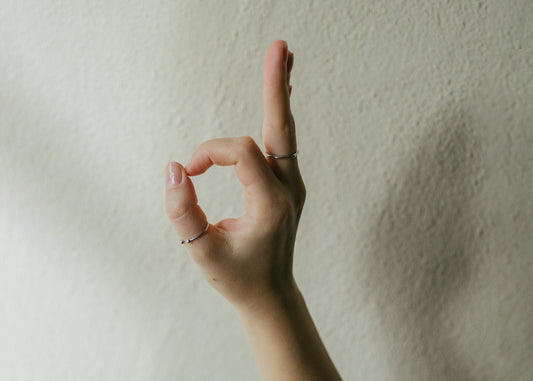
NEW In!
PURE-Matte Light TaupeShopping cart
Your shopping basket is empty
Yoga

Meditation
Sets & Bundles
“Fear has its own beauty, delicacy, sensitivity. In fact, she is a very delicate creature. The word is negative, but the feeling itself is positive. Only living processes can be afraid. Something dead is not afraid. Fear is part of aliveness, of fragility, of sensitivity.” - Osho Above All, Don't Wobble

As humans, we experience a diverse range of emotions. We feel joy, love and compassion, but there are also uncomfortable feelings like fear and worry. Osho describes it very aptly: These sensations, even if it is fear, reflect our aliveness. Fear and worry are nothing bad, we just need to learn to deal with these feelings better so that they don't completely throw us off course. World events and personal issues are always with us, because life always flows on and we usually have no influence on what things we are confronted with. This often causes an uncomfortable feeling, constriction in the heart, sleepless nights and a never-ending merry-go-round of thoughts.
Incidentally, our body does not distinguish whether the feeling of fear that arises in us is justified or not - as soon as the signal to fight for survival comes, the body and the nervous system switch to "fight or flight" and we operate out of an inner tension. This can be very exhausting for the body and mind.
Of course there are phases in life in which fear and worry have their right to exist, for example when we are going through difficult situations or we are plagued by fears about the future or existential fears. Yoga and meditation cannot simply erase or undo challenging external influences, but the practices can anchor us when our fears threaten to overwhelm us.
Yoga and meditation can be our haven of peace when it is restless and stormy inside and out. Yoga and meditation can help us to break out of the feeling of controllessness and to come back to ourselves.
At this point we would like to note that a yoga practice does not replace a therapist if you have panic attacks or anxiety! In this case, seek competent support and use the tools of yoga as an add-on.
The practice of meditation includes various techniques to focus and still the mind and to withdraw perception from the outside world. Various forms of meditation are used so that body and mind can immerse themselves completely in stillness.
The spiritual practice of meditation has its roots in many different cultures and religions, including the millennia-old philosophy of yoga.
Meditation teaches us to take on the role of an objective observer and, from this attitude of mind, to look at our thoughts and feelings in a nonjudgmental manner. From this higher perspective we can also look at our fears and worries and then get a new picture. Maybe we realize that our worries are unjustified and only cost us energy, maybe we see that our fears are signposts to inner issues that can be worked on and maybe we also understand that our fears very often prevent us from living things out, what our heart longs for most.

Fear is experienced in the mind, but it triggers a strong physical response in your body. When you sense fear, your amygdala (a small organ in the middle of your brain) kicks in. It alerts your nervous system, which triggers your body's fear response. Stress hormones like cortisol and adrenaline are released and the body prepares for fight or flight. Anxiety is an emotion that is triggered when we don't feel safe or are under tension or worried thoughts.
Face your fears and worries with mindfulness and ask yourself the question:
Why am I afraid of xy (something or situation)? What is the feeling behind the fear? What is my fear trying to show me?
When it comes to anxiety, studies have shown that meditation has an organic effect on the brain. Changes in the amygdala, the part of the brain that plays an important role in triggering fear reactions, among other things, have been observed in people who practice meditation regularly.
Furthermore, various studies have researched and proven how a regular practice of meditation changes certain areas in the brain and thus has a positive effect on our stress response, emotions and cognitive abilities.
Fear and worry can manifest themselves in the body and mind as follows:
Meditation with its diverse techniques helps us to focus on the moment in the here and now , connected with body, breath and mind. It brings us back from the emotional waves and what is happening outside. The fear-inducing thoughts are allowed to have space, but we can learn to just let them pass without having an emotional response. Meditation provides clarity and makes it easier to deal with fears by observing and accepting them neutrally.
The practical application of meditation and mindfulness naturally helps us to reduce fears, because most fears originate either in the past and stressful situations or we worry about the future. Our minds try to be in control and there are so many things in our lives that we have no control over. Here, a yoga and meditation practice gives us the necessary tools to stay in inner balance.
In the following blog posts you will find valuable information, tips and meditation techniques that can help you to establish a meditation routine:
- Meditation for beginners: How to learn to meditate!
- Five meditation exercises for beginners

What is acupressure? Acupressure treatment is a healing method that is more than 5000 years old and has its origins in Asia. Acupressure stimu...
Continue reading
Many people initially view the topic of tantra with some prejudices and not infrequently with a wrong image, since certain practices, for example ...
Continue reading